Paracelsus: Physician, Alchemist, Philosopher Well Ahead Of His Time
A. Sutherland - AncientPages.com - Paracelsus (1493 - 1541) - was a Swiss-German botanist, philosopher, astrologer, alchemist, and one of the most influential medical scientists in early modern Europe.
His real name was Philippus Aureolus Theophrastus Paracelsus Bombastus von Hohenheim but he was celebrated as "Paracelsus."
His career differed radically from many of his colleagues.
At sixteen years of age, Paracelsus was already well acquainted with alchemical knowledge. After spending some time at the University of Basle, he led a wandering life, traveled throughout Europe, even visiting Arabia, Egypt, Russia, Finland, and the Arctic region, dispensing powerful wisdom centuries ahead of his time.
"Poison is in everything, and nothing is without poison. The dosage makes it either a poison or a remedy. Paracelsus
Working in the mines of Sigismund Fugger, he acquired valuable knowledge of metals and ores; he also studied diseases of his fellow-workers. Paracelsus had many talents and was gifted by nature. He believed that Nature was the best healer and that the best results could be achieved by natural methods.
Driven by invincible life energy and despite his unhealthy way of life, Paracelsus wrote over ten thousand pages devoted to surgery, alchemy, astrology, and theology.
Due to constant conflicts with his employers and even colleagues, he had not so often any permanent job.
"They drove me out of Lithuania, and Prussia, and Poland…The Dutch did not like me either, nor the schools… but thank God, the patients liked me!”
He was a visionary who considered chemistry the key to the whole universe where God was the divine alchemist who created the world.
This highly controversial scientist had a great knowledge of alchemy, surgery, and medicine and was strongly against superstitions and misconceptions and all authorities.
Paracelsus was a symbol-figure who stood for heroism, but he was also considered a charlatan. Traditionally working doctors accidentally killed dozens of his patients, according to Paracelsus, through their old-fashioned and dangerous treatment of the so-called blood-letting, a practice that Paracelsus firmly opposed.
The art of healing comes from nature, not from the physician. Therefore the physician must start from nature, with an open mind. Paracelsus
In one of his most polemical writings, a book from 1531 with the intriguing title "Paragranum" (Beyond The Seed) Paracelsus states that all physicians who follow Claudius Galenus (AD 129 – 199/217) teachings should be burned at the stake, exposed to cholera infection, drowned in mud or tormented by mosquitoes.
He made claims to manufacture potable gold granting prolonged youth and his claims may have been symbolic for the esoteric doctrine of a Universal Medicine based upon Light - the creative agent, the vibrations of which constitute the movement and life of all things. He deeply believed that medicine is supported by four pillars - philosophy, astronomy, alchemy, and ethics.
Paracelsus was one of the first physicians who gave special importance to using chemicals, minerals in medical treatment as well as opiates as anesthetics in surgery. Paracelsus's works greatly influenced the early Rosicrucians and some of his impressive ideas are startling even today.
Written by – A. Sutherland AncientPages.com Staff Writer
Copyright © AncientPages.com All rights reserved. This material may not be published, broadcast, rewritten or redistributed in whole or part without the express written permission of AncientPages.com
Expand for referencesMore From Ancient Pages
-
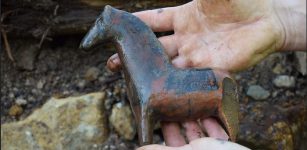 World’s Oldest Dala Horse Discovered In Sweden
Archaeology | Jul 18, 2020
World’s Oldest Dala Horse Discovered In Sweden
Archaeology | Jul 18, 2020 -
 Impressive Textile Reconstruction Shows What Viking Age People Dressed Like
Featured Stories | Sep 26, 2023
Impressive Textile Reconstruction Shows What Viking Age People Dressed Like
Featured Stories | Sep 26, 2023 -
 Student Finds Beautiful Viking Age Silver Hoard In Aarhus, Denmark
Vikings | Aug 21, 2024
Student Finds Beautiful Viking Age Silver Hoard In Aarhus, Denmark
Vikings | Aug 21, 2024 -
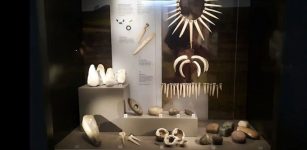 Ancient Goldsmith’s Toolkit Discovered Near Stonehenge
Archaeology | Dec 16, 2022
Ancient Goldsmith’s Toolkit Discovered Near Stonehenge
Archaeology | Dec 16, 2022 -
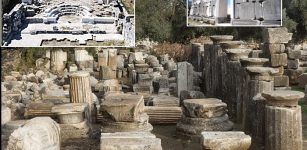 Restorations At Stratonicea Ancient City Of Gladiators In Turkish Muğla Province
Archaeology | May 10, 2023
Restorations At Stratonicea Ancient City Of Gladiators In Turkish Muğla Province
Archaeology | May 10, 2023 -
 Chickens Were Introduced To Britain, Mainland Europe, And Northern Africa Later Than Previously Thought
Archaeology | Jun 13, 2022
Chickens Were Introduced To Britain, Mainland Europe, And Northern Africa Later Than Previously Thought
Archaeology | Jun 13, 2022 -
 Remarkable Discovery Of A 19th-Century Boat Buried Under A Road In St. Augustine, Florida
Archaeology | Oct 16, 2023
Remarkable Discovery Of A 19th-Century Boat Buried Under A Road In St. Augustine, Florida
Archaeology | Oct 16, 2023 -
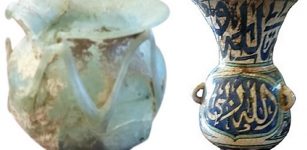 Attempt To Smuggle Three Artefacts From Alexandria Port – Failed
Artifacts | Oct 28, 2020
Attempt To Smuggle Three Artefacts From Alexandria Port – Failed
Artifacts | Oct 28, 2020 -
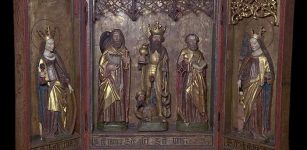 History Of Middle Ages Altarpieces Has Been Re-Written
Archaeology | Mar 10, 2018
History Of Middle Ages Altarpieces Has Been Re-Written
Archaeology | Mar 10, 2018 -
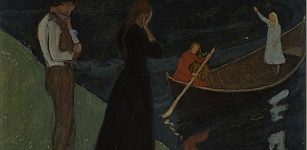 Tuonela – The Land Of The Dead In Beliefs Of Ancient Finnish People
Featured Stories | Nov 9, 2021
Tuonela – The Land Of The Dead In Beliefs Of Ancient Finnish People
Featured Stories | Nov 9, 2021 -
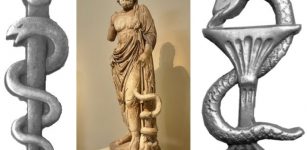 Why Is A Snake Symbol Of Medicine And Pharmacies?
Ancient History Facts | Jan 15, 2018
Why Is A Snake Symbol Of Medicine And Pharmacies?
Ancient History Facts | Jan 15, 2018 -
 A 2,500-Year-Old Planned City In Tarighat, Chhattisgarh, India
Civilizations | Oct 8, 2014
A 2,500-Year-Old Planned City In Tarighat, Chhattisgarh, India
Civilizations | Oct 8, 2014 -
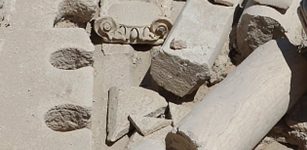 2,000-Year-Old Lavatory In Turkey’s Denizli Province Will Be Restored
Archaeology | Aug 4, 2020
2,000-Year-Old Lavatory In Turkey’s Denizli Province Will Be Restored
Archaeology | Aug 4, 2020 -
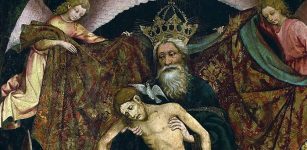 Looted ‘Pietas Domini’ Gothic Altar Dated To 1435 AD Returns From Germany To Poland
Archaeology | Mar 22, 2020
Looted ‘Pietas Domini’ Gothic Altar Dated To 1435 AD Returns From Germany To Poland
Archaeology | Mar 22, 2020 -
 Silver And Bronze Coins Discovered In Ancient Roman Fort Apsaros, Georgia
Archaeology | Jul 23, 2018
Silver And Bronze Coins Discovered In Ancient Roman Fort Apsaros, Georgia
Archaeology | Jul 23, 2018 -
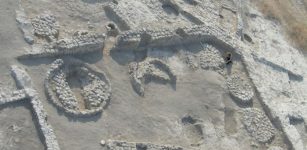 Olive Trees Were First Domesticated 7,000 Years Ago In The Jordan Valley
Archaeology | Jun 17, 2022
Olive Trees Were First Domesticated 7,000 Years Ago In The Jordan Valley
Archaeology | Jun 17, 2022 -
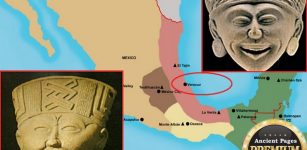 Curious Pre-Columbian Clay Figurines With Smiling Faces From Veracruz
Ancient Mysteries | Jan 29, 2018
Curious Pre-Columbian Clay Figurines With Smiling Faces From Veracruz
Ancient Mysteries | Jan 29, 2018 -
 Arsinoe II Rose To Power Through Manipulations, Murder, Conspiracies And Became Worshiped As A Goddess
Featured Stories | Apr 26, 2019
Arsinoe II Rose To Power Through Manipulations, Murder, Conspiracies And Became Worshiped As A Goddess
Featured Stories | Apr 26, 2019 -
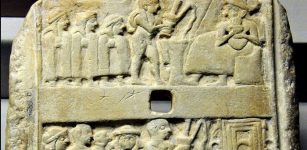 Ur – One Of The Largest And Most Important Cities Of Ancient Mesopotamia
Featured Stories | Jul 28, 2021
Ur – One Of The Largest And Most Important Cities Of Ancient Mesopotamia
Featured Stories | Jul 28, 2021 -
 On This Day In History: Battle Of Dettingen – English Armies Were Victorious Over The French – On June 27, 1743
News | Jun 27, 2016
On This Day In History: Battle Of Dettingen – English Armies Were Victorious Over The French – On June 27, 1743
News | Jun 27, 2016


